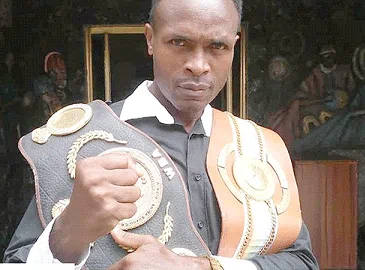Reactions have continued to pour in following the tragic death of former Nigerian and West African light heavyweight boxing champion, Segun ‘Success’ Olarewaju, who passed away in Ghana during a fight last weekend. Former British and Commonwealth Light Heavyweight champion, Peter Oboh, has expressed deep concern about the safety of Nigerian boxers, fearing that more fatalities could occur if proper medical and professional standards are not enforced.
Speaking on the incident, Oboh, who is back in Nigeria after an accomplished boxing career in Europe, lamented that such avoidable tragedies are still happening despite advancements in medical and technological standards in sports. Oboh pointed to the lack of regulation and negligence within the Nigerian boxing system as contributing factors to the fatality.
In the United Kingdom, where Oboh spent much of his career, he explained that boxers are required to undergo yearly comprehensive medical checkups. These checks include blood tests, brain scans, assessments of weight, breathing, eyesight, and hearing. If any boxer fails any of these tests, their license is immediately revoked, ensuring that only healthy athletes compete. Oboh called for similar stringent measures to be implemented by the Nigerian Boxing Board of Control (NBBC).
He further stressed that not every fight should be taken, especially unscheduled ones. “It is dangerous for a boxer to take an unscheduled fight,” Oboh warned, explaining that fighters may be forced to lose weight quickly or take unsafe measures to match a weight category, leading to exhaustion and potentially fatal consequences. He speculated that this may have contributed to Olarewaju’s untimely death, noting that boxers often expend excessive energy in preparation for fights, which can result in severe health complications.
Oboh, now a pastor, insisted that thorough preparation and adequate medical screenings are crucial to preventing such incidents. He highlighted that the pre-fight medical exams, which are often limited to basic checks like eyesight and weight, are not enough to guarantee the safety of boxers. “There must be periodical check-ups for our boxers to prevent tragedies like Segun Olarewaju’s,” he emphasized.
He also cited the issue of poverty as a major factor in Nigerian boxing. According to Oboh, many boxers, particularly those struggling financially, take up fights without proper preparation simply to make ends meet. “When a boxer is broke, he takes up fights without adequate preparation. This should not be the case,” he said. Oboh concluded by expressing concern that unless Nigerian boxers are better supported financially, the situation may continue to put their lives at risk.
As the boxing community continues to mourn Olarewaju’s loss, Oboh’s comments highlight the urgent need for reforms within Nigerian boxing to ensure the safety and well-being of its athletes.
